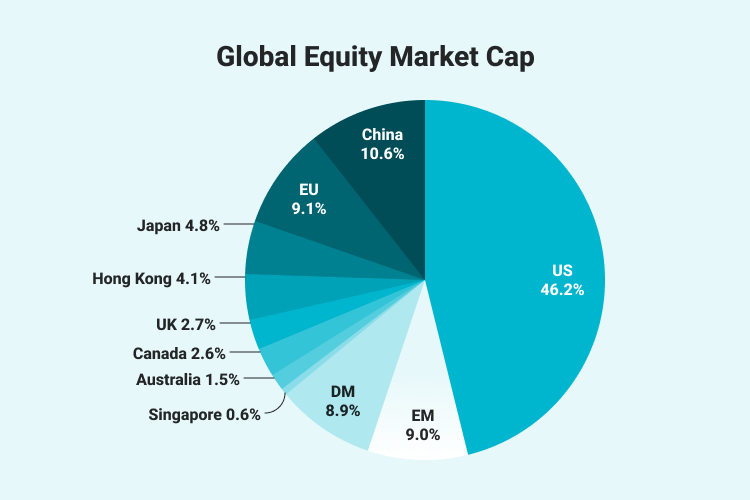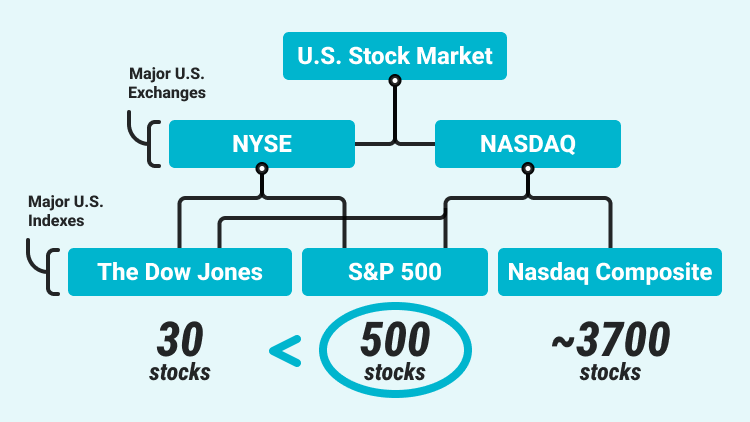The overview of the U.S. stock market
The stock market consists of exchanges, and stocks are listed on a specific exchange in which the stock shares are bought and sold by the traders. The U.S. stock markets are the largest in the world and among the deepest, most liquid, and most efficient ones as always, representing 46.2% of the $111 trillion global equity market cap with $51 trillion. Details are shown as below:

Besides its huge size, the U.S. market’s performance is also outstanding when compared to others. For example, the S&P 500 index acts as a benchmark of the performance of the U.S. stock market overall, and it has returned a historic annualized average return of around 11.88% since its 1957 inception through the end of 2021, according to Investopedia.
Who participates in the U.S. stock market?
The numerous advantages of investing in US stocks draw more and more investors and corporations participate in the U.S. stock market. Here are some of the key players you should know about:
- Retail investors. Individual investors are typically represented by brokers, and many of them are online brokers. Investors submit buy and sell orders to the broker who then deals with the exchange on their behalf.
- Stockbrokers. Stockbrokers charge a fee for handling trades between buyers and sellers of securities. They may buy securities from their customer who is selling or sell from their own inventory to their customer who is buying.
- Investment advisers/portfolio managers. Investment advisers are persons or firms that are in the business of providing investment advice to investors or issuing reports or analyses regarding securities. Portfolio managers often manage relatively large portfolios, so they make decisions to buy and sell large amounts of stocks.
- Investment banks. Investment banks help companies list shares on stock exchanges, handling the initial public offering (IPO) of a company which first decides to become a publicly traded company by offering stock shares.
Getting to know the US stock exchanges
A stock exchange is a marketplace in which US financial securities, commodities, derivatives, and other financial instruments are traded. Simply put, stock exchanges bring together the companies and current shareholders who want to sell their stock, and the investors who want to buy the stock from them. In the United States, the two major U.S. financial securities markets are the New York Stock Exchange and Nasdaq:
- New York Stock Exchange (NYSE). NYSE, founded in 1790, is a stock exchange in New York City which is the largest equities-based exchange in the world based on the total market capitalization of its listed securities. Many of the oldest publicly traded US companies are listed on the NYSE, and they are considered more stable and well-established.
- Nasdaq. The Nasdaq exchange is the second-largest US stock exchange created in 1971, and it is the largest electronic screen-based market with about 3,300 listed stocks. The Nasdaq is known for its technology and innovation, and it is home to digital, biotechnology, and other companies as industrial leaders. As such, stocks traded on the Nasdaq market are considered growth-oriented and more volatile. Many corporate giants are Nasdaq-listed ones— such as Apple, Google, Microsoft, Meta (formerly Facebook), Amazon, etc.
What are major U.S. stock indexes?
A stock index is a group of companies that tracks a slice of the financial market – whether that be a single industry, region, exchange, or even the global market as a whole. Stock indexes are useful because they allow investors to easily track how well the stock market is doing at a given time, or in which direction it is trending over time. For example, the S&P 500 is one of the most commonly used stock indexes, and when the index is high, it means that the shares of the companies the index tracks have increased in value on average. In the United States the S&P 500, Dow Jones Industrial Average, and Nasdaq Composite are the three most broadly investor-followed indexes.

- S&P 500. Standard & Poor's 500, commonly known as the S&P 500, is an index with more than 500 of the leading companies in leading industries in the United States, representing approximately 80% of the total market capitalization. In general, the S&P 500 Index gives a good indication of movement in the U.S. market as a whole.
- The Dow Jones Industrial Average (DJIA). The Dow Jones Industrial Average (DJIA), also known as the Dow 30, is one of the oldest, most well-known, and most frequently used indexes in the world. The index tracks 30 large, publicly owned blue-chip companies trading on the New York Stock Exchange (NYSE) and Nasdaq. As industrial companies are typically tied to the overall growth rate in the economy, their performance is widely considered to be a useful indicator of the health of the entire U.S. stock market and the economy.
- Nasdaq Composite Index. The Nasdaq index tracks more than 3,700 stocks listed on the Nasdaq stock exchange, and the technology sector accounts for just over half of the index, more than three times the index weight of any other market sector. Due to the index being dominated by the historically volatile technology sector, index performance tends to be more volatile than that of the S&P 500 or the Dow.



